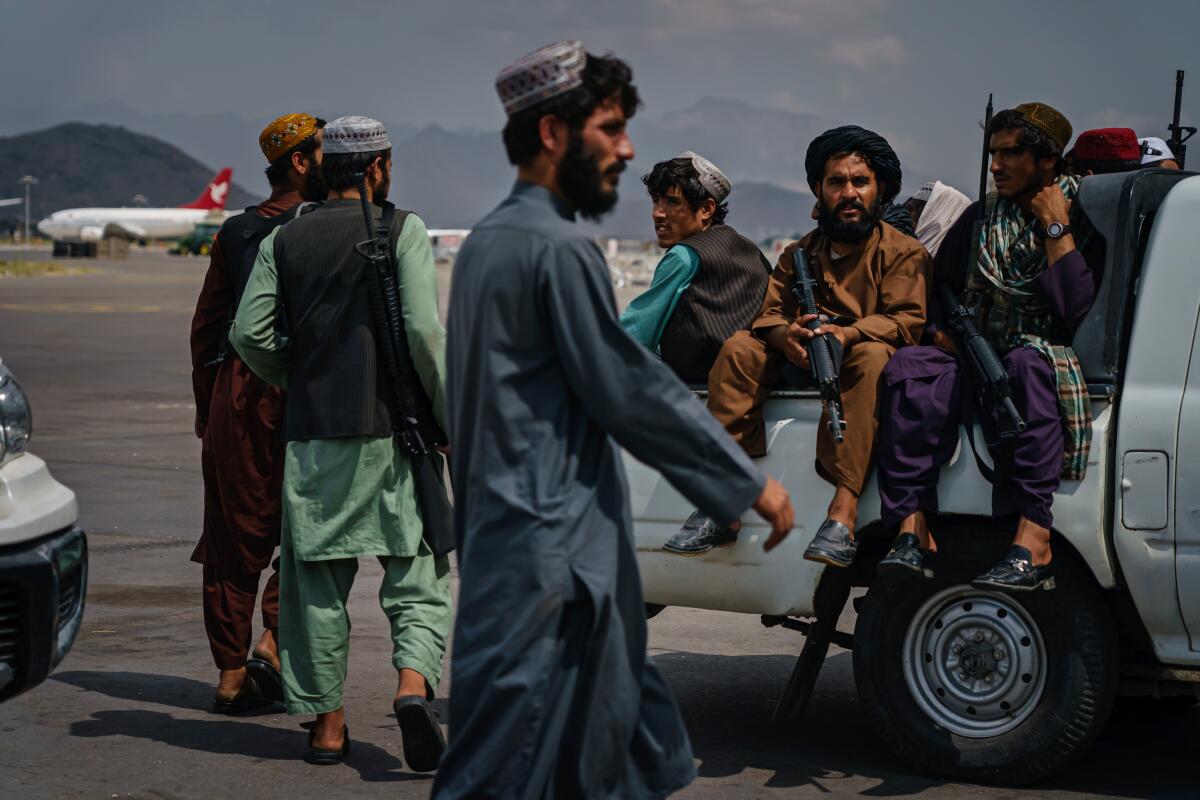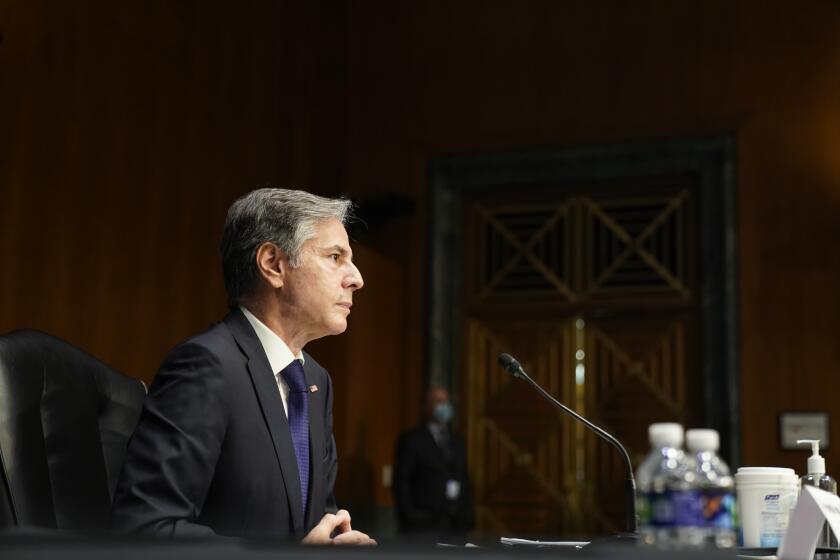U.S. visa lottery winners feel ‘hopeless’ in struggle to leave Afghanistan

- Share via
WASHINGTON — The State Department is continuing to prioritize evacuating U.S. citizens and special immigrant visa holders from Afghanistan after the Taliban takeover, but others seeking visas have remained at the bottom of the list. Those with lower priority are applying for diversity visas, which are issued to up to 55,000 people each year from countries with low rates of immigration to the United States.
Farooq, his wife and two infant children were among the randomly chosen winners in this year’s diversity visa lottery. The 32-year-old from Mazar-i-Sharif, who asked that his last name not be used because he fears retaliation from the Taliban, said they made it to Hamid Karzai International Airport in Kabul last month before they were turned away by the militants.
For the record:
10:39 a.m. Sept. 17, 2021This story has been updated to reflect that Pakistan, not the U.S. Embassy in Pakistan, has reportedly offered visitor visas to U.S. diversity visa applicants from Afghanistan to travel to Islamabad, Pakistan’s capital.
“We don’t think we have a bright future, and we’re hopeless right now,” he told the Los Angeles Times in a Zoom call. “We don’t know what will happen.”
Despite a U.S. district judge’s ruling Sept. 9 that the State Department must expedite the processing of this year’s diversity visa lottery winners by Sept. 30, and that it must stop deprioritizing them, Afghans and their advocates say it’s unlikely the U.S. government will meet this deadline.
“They have not told us what they are going to do to effectuate that order and that’s concerning to us,” said Rafael Ureña, a New York immigration attorney who represents the plaintiffs in one of three lawsuits addressed by the ruling.
Beginning during the Trump administration, diversity visa applicants faced various barriers including the travel bans placed on residents of some Muslim-majority and African countries, disruptions due to the COVID-19 pandemic, and a policy implemented in April 2020 that temporarily halted the diversity visa program. Under the Biden administration, diversity visa processing has been allowed to resume, but the process has been slow and the timeline has been unclear, said Banan Al-Akhras, a law clerk who works with Ureña.
Afghans face an additional barrier. Visa applicants are required to appear in person before a consular officer, but the U.S. Embassy in Kabul that normally processes immigrant visas ceased its operations Aug. 31, meaning these applicants’ cases must be transferred to another embassy or consulate, according to a statement from the State Department.
“The State Department attorneys have not responded to our emails about where these individuals can go to have their cases adjudicated,” Ureña said.
The State Department maintains that although it is unable to provide in-person consular services in Afghanistan for immigrant visa applicants, including diversity visa applicants, it is developing alternatives.
In its statement to The Times, the department said it would “undertake good-faith efforts to expeditiously process Diversity Visa 2021 applications by September 30” in accordance with the Sept. 9 ruling and has instructed embassies and consulates to make “every effort within their discretion and subject to resource constraints, limitations due to COVID-19 pandemic, and country conditions” to prioritize the processing of this year’s diversity visas.
Secretary of State Antony J. Blinken testifies to a Senate committee about the U.S. withdrawal from Afghanistan.
On Tuesday, Secretary of State Antony J. Blinken spent a second day on Capitol Hill defending the Biden administration’s handling of the U.S. withdrawal from Afghanistan. He briefly alluded to the State Department developing efforts to help Afghans acquire visas — but told senators he prefers to discuss the matter privately.
More than 2,000 diversity visa lottery winners this year are waiting to leave Afghanistan, Ureña said, which they cannot do without a visa already in hand. The clock is ticking, as each year’s cohort of winners has until Sept. 30 of that year to receive a visa, undergoing a process that includes a consular interview.
If the government cannot meet that deadline and schedule the interviews in time, the families will lose their spot in line — and the opportunity to receive visas this year that will fast-track their path to U.S. citizenship — unless there is a judicial order preserving their visas past that date, Ureña said. He said his team has scheduled a hearing on Sept. 27 to push for an order that would extend this year’s lottery winners’ ability to acquire diversity visas beyond the end of the month.
“If [the State Department] wants to have the Afghans interviewed before the deadline, they would have to identify and schedule them for interviews immediately,” Ureña said.
The State Department declined to specify the number of diversity visas that will be issued this year, but it acknowledged it was unlikely to issue the full allotment because of the pandemic.
Al-Akhras said Afghan diversity visa applicants have been trying to find U.S. embassies in third countries in order to acquire visas but can’t always get there.
Pakistan, she said, has offered to issue visitor visas to Afghans with visa appointments so they can travel to the U.S. Embassy in Islamabad, Pakistan’s capital.
“But we’ve had people get to the border [between Afghanistan and Pakistan] and be turned away,” Al-Akhras said, adding that it has been difficult for Afghans to schedule visa appointments at other embassies. “They are being blocked by every country that they’re surrounded by.”
The State Department said it is advising visa applicants to check with relevant embassies and consulates ahead of time about local restrictions and whether those offices have the capacity to serve them.
Al-Akhras said the U.S. Embassy in Islamabad has also sent mixed messages. An Afghan client who made it to Pakistan was told in an email that the embassy has “not been designated a processing post for Immigrant or Diversity Visas for Afghans and [is] not accepting transfer cases for applicants not currently resident in Pakistan.”
However, the embassy in Islamabad was apparently instructed to respond to this year’s Afghan diversity visa applicants who are in Pakistan with the following automated message, according to an email Al-Akhras forwarded to The Times from the embassy: “Thank you for your inquiry. Based on the information you submitted, it appears this case can be processed in Islamabad. Post will contact the Kentucky Consular Center (KCC) to see if it is possible. If so, we will request a transfer of the case to Islamabad and KCC will communicate with you about the interview details.”
Meanwhile, some lawmakers and advocates are pushing for legislation that would address the backlog in issuing and processing diversity visas. One mechanism for doing so is through budget reconciliation — in particular, through legislation co-sponsored by Reps. Ritchie Torres (D-N.Y.) and Judy Chu (D-Monterey Park) that would offer diversity visas to lottery winners who were unable to receive visas because of travel bans and COVID-19-related disruption.
The bill, which has the support of 21 congressional lawmakers, has been included in the House Judiciary Committee’s immigration legislation for the budget reconciliation package. It has yet to be included in the legislation by the panel’s Senate counterpart and needs approval from the Senate parliamentarian, who must deem it relevant to the budget.
More to Read
Get the L.A. Times Politics newsletter
Deeply reported insights into legislation, politics and policy from Sacramento, Washington and beyond. In your inbox twice per week.
You may occasionally receive promotional content from the Los Angeles Times.












